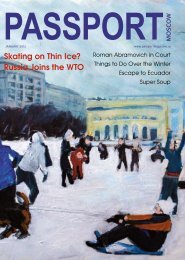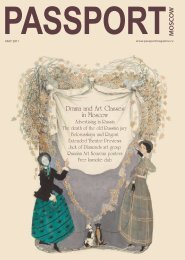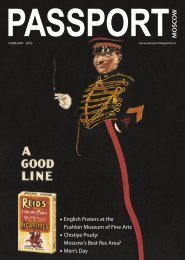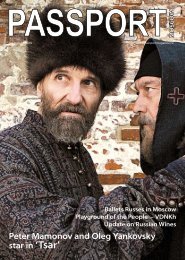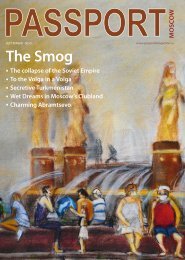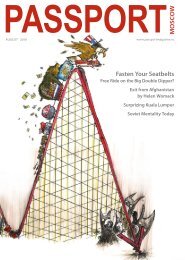M O S C O W Interview with Leonid Shishkin - Passport magazine
M O S C O W Interview with Leonid Shishkin - Passport magazine
M O S C O W Interview with Leonid Shishkin - Passport magazine
Create successful ePaper yourself
Turn your PDF publications into a flip-book with our unique Google optimized e-Paper software.
The Dead Novelists<br />
Society<br />
Two other books in the<br />
series are also available:<br />
The Girl who Played <strong>with</strong><br />
Fire and The Girl who<br />
Kicked the Hornets’ Nest<br />
Ian Mitchell<br />
Last month the third and final book in<br />
the strange but wildly popular series of<br />
crime novels by the Swedish journalist,<br />
Stieg Larsson, was published. Why am<br />
I so confident that this will be the last,<br />
when publishers like to extend successful<br />
series almost indefinitely these days?<br />
Because Mr Larsson is dead. And the<br />
curious thing is that he died in circumstances<br />
ominously connected <strong>with</strong> the<br />
subject-matter of his novels.<br />
The heroine of the series is a tiny,<br />
lightly-built, unattractive, anti-social, bisexual<br />
computer ace <strong>with</strong> a love of violence,<br />
a hatred of men, a photographic<br />
memory and a preference for black lipstick<br />
and revenge of the classic Calvinist<br />
sort: two eyes for an eye; two teeth for<br />
a tooth. She seems to think of herself as<br />
incarnating the wrath of God.<br />
Her name is Lisbeth Salander and she<br />
lives in Stockholm, a city not normally<br />
noted for ugly, mannerless, man-hating<br />
savages. But then the plots of the books<br />
turn mostly on the belief, which the<br />
journalist hero, Mikael Blomqvist, shares<br />
<strong>with</strong> the author, that Swedish society is<br />
riddled <strong>with</strong> misogynistic corruption,<br />
especially in the semi-fascist police<br />
force and security services. It deserves<br />
the vengeance of Lisbeth Salander.<br />
Blomqvist is, as Larsson was in real<br />
life, involved in publishing a left-wing<br />
<strong>magazine</strong> which exposes these malign<br />
influences. He is a hero of the dull, selfrighteous,<br />
moralistic sort that anyone<br />
who has experience of the international<br />
charity industry will be familiar <strong>with</strong>. He<br />
never laughs, rarely smiles, never makes<br />
a joke, and never does anything irrational,<br />
passionate or poetic. Apart from<br />
having sex occasionally, he does nothing<br />
but plod away making the world a<br />
better place.<br />
Happily for the novel, he is attacked<br />
by a super villain, is defeated and nearly<br />
bankrupted and, as a form of salvation,<br />
asked to solve the mystery of a series of<br />
murders in rural Sweden, which he manages<br />
to do only <strong>with</strong> the help of little Lisbeth.<br />
They do so in the spirit of people<br />
who refuse payment for work they did<br />
for moralistic reasons. They are not presented<br />
as likeable people, or even particularly<br />
interesting ones. Indicative of<br />
the author’s approach is the Swedish title<br />
of this book: Men who Hate Women.<br />
The writing focuses on material things<br />
to the extent that you learn more about<br />
the square-footage of the character’s<br />
apartments than you do about their<br />
emotional lives and inner motivation.<br />
You really need a map of Stockholm to<br />
follow parts of the story. And the villains<br />
are such wooden, two-dimensional,<br />
predictable characters that they could<br />
almost have been invented by Jeffrey<br />
Archer. The prose is <strong>with</strong>out a glint of<br />
anything resembling wit. You get life<br />
histories <strong>with</strong> dutiful completeness, but<br />
as Robert Graves said of the Bible, the<br />
ultimate moralisers’ text, there is “not a<br />
smile from Genesis to Apocalypse”.<br />
So why have these books sold so well?<br />
In 2008, Larsson was the world’s second<br />
best-selling novelist. I suggest there are<br />
two reasons, if one disallows the fad for<br />
Nordic fiction which erupted after Peter<br />
Høeg published Miss Smilla’s Feeling for<br />
Snow and Henning Mankell hit the top<br />
of the charts <strong>with</strong> the ‘Detective Wallender’<br />
books. The first one is that Lisbeth<br />
Salander, for all her awfulness, is actually<br />
a curiously attractive character in<br />
her context.<br />
That context is the hideously conventional<br />
and, dare I say it?, unRussian world<br />
of respectable Swedish society. She is a<br />
rebel, and small and fragile <strong>with</strong> it. Also<br />
she has a cause, which is not justice, as<br />
the dreary Blomqvist seems to think,<br />
but just to say “Sod the lot of you!” to<br />
complacent, conformist Swedish bourgeois<br />
society. Not surprisingly, she is revealed<br />
to have foreign blood in her. And<br />
that foreign blood is as dangerously anarchic<br />
as it seems a moralistic Swedish<br />
novelist can invent: her father is Russian,<br />
and an ex-KGB agent to boot!<br />
The second factor is the strange<br />
story surrounding the author himself.<br />
He came from a family of committed<br />
The Girl <strong>with</strong> the<br />
Dragon Tattoo<br />
Stieg Larsson<br />
Maclehose Press £7.99<br />
978-1-84724-545-8<br />
communists in the hard-scrabble north<br />
of Sweden. Larsson was a militant leftwinger,<br />
so much so, that he left the<br />
huge fortune resulting from the success<br />
of these books to the Communist<br />
Party in his hometown, of Umeö. Control<br />
has gone to his father and brother,<br />
excluding completely his wife of 30<br />
years. He did not even like the brother,<br />
but presumably the cause was more<br />
important than his wife, who has been<br />
left penniless.<br />
Larsson died on 9 November 2004<br />
which, as the British journalist, Christopher<br />
Hitchens, has pointed out, is the<br />
anniversary of Kristallnacht. Officially,<br />
he suffered a heart attack, but there<br />
are rumours that he was the victim of a<br />
murder plot by a Swedish ex-SS veteran.<br />
He was only 50.<br />
His British publisher has said, “I know<br />
someone <strong>with</strong> excellent contacts in the<br />
Swedish police and security world who<br />
assures me that everything described in<br />
these book actually took place. Larsson<br />
planned to write ten books in all. So you<br />
can see how people could think that<br />
he might not have died but have been<br />
‘stopped’.”<br />
Perhaps that is what makes these<br />
book compelling reading. Behind the<br />
prosaic glumness, there is something<br />
real about the stories: life red in tooth<br />
and keyboard. P<br />
June 2010<br />
Book review




